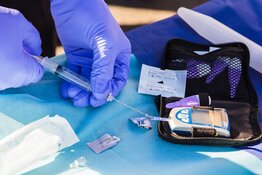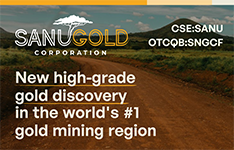Medexus Pharmaceuticals Inc. (MDP:TSX; MEDXF:OTCQX) clarified details of the cash payment it is obligated to make to its German pharma partner Medac GmbH if the U.S. Food and Drug Administration (FDA) approves the former's drug, treosulfan, for bone marrow conditioning, reported Dr. Douglas Loe, Leede Financial Inc. managing director and analyst, in a Dec. 2 research note. The FDA's decision is expected in January 2025.
"A favorable FDA review is imminently justified in our view and if it transpires, would mitigate risk to our fiscal years 2026 to 2028 (FY26–28) revenue and EBITDA projections," Loe wrote, based on Leede Financial's review of treosulfan's published clinical history and despite the drug's U.S. regulatory history being "clearly mixed."
200% Return Potential
Leede reiterated its CA$8.25 per share target price on Medexus, now trading at around CA$2.75 per share, noted Loe. The difference between these prices implies a possible 200% return for investors.
The Ontario, Canada-based biopharma remains a Speculative Buy.
"Near-term shareholder value creation is more event driven at present and heavily focused on the aforementioned U.S. FDA treosulfan regulatory review," Loe commented.
Potential Payment Amounts
The amount of the payment to Medac, which an FDA approval of treosulfan will trigger, will be between US$15 million (US$15M) and US$45M, depending on the drug labeling the agency requires and/or allows. In comparison, the biopharma had US$6.9M in cash as of Sept. 30, 2025, the end of its Q2 FY25.
On the lower end of the range, Medexus must pay US$15M if the FDA does not require any comparative characteristics of treosulfan on the product label. The payment will be US$20M if the FDA allows treosulfan to be deemed noninferior, but not clinically superior, to alternative bone marrow conditioning drugs. Loe noted these specifications likely pertain to the competing drug, busulfan.
The payment to Medac jumps to US$45M if the FDA allows Medexus to claim treosulfan is clinically superior to alternative drugs. According to Loe, Treosulfan warrants this claim based on its clinical data, and Leede Financial would like to see this outcome even though it would increase near-term financial risk to Medexus.
"We do not however expect the U.S. FDA to be that daring on label claims it will initially endorse for treosulfan, at least not when considering the drug's mixed regulatory history with the agency," Loe wrote.
Payment Timeline Provided
Medexus provided a payment schedule only for the lowest potential amount owed, US$15M, reported Loe. The firm indicated it would remit the total in three tranches in consecutive quarters, the last one by calendar year-end 2025.
Specifically, the life sciences firm would pay Medac US$2.5M by the end of Q1 FY26 (June 30, 2025), US$5M at the end of Q2 FY26 (Sept. 30, 2025) and US$7.5M at the end of Q3 FY26 (Dec. 31, 2025).
Medexus may defer any of these payments at its discretion, by three months for the first one, four months for the second and one month for the third, but on any delayed payments it must add 9% in annualized interest. Despite having the option, Medexus likely will not delay payments, Loe purported.
Peak Sales of US$100M
Medexus management reiterated its projection that treosulfan could achieve peak U.S. sales of US$100M within five years of a commercial launch there, Loe reported. Leede Financial believes this is aggressive, based on its pricing assumptions, the expected pace of adoption in acute myeloid leukemia and myelodysplastic syndrome allogeneic hematopoietic stem cell transplantation procedures and the understanding treosulfan only will target these two indications during the forecast period.
Yet, Leede Financial still models that peak U.S. treosulfan sales of US$83M–96M are achievable by FY33–FY34 but believes attaining this might require higher pricing and expanded indications in transplantation medicine for the drug, wrote Loe. The model assumes that treosulfan could be priced at about US$8,500–9,500 per procedure, at a premium to alternative bone marrow conditioning agents, like busulfan, now at generic pricing.
"Over time, it is conceivable that treosulfan could be deployed as a bone marrow conditioning agent in transplantation markets where only autologous stem cell transplantation procedures are conducted, including in multiple myeloma and in other leukemia forms," added Loe.
| Want to be the first to know about interesting Biotechnology / Pharmaceuticals investment ideas? Sign up to receive the FREE Streetwise Reports' newsletter. | Subscribe |










































